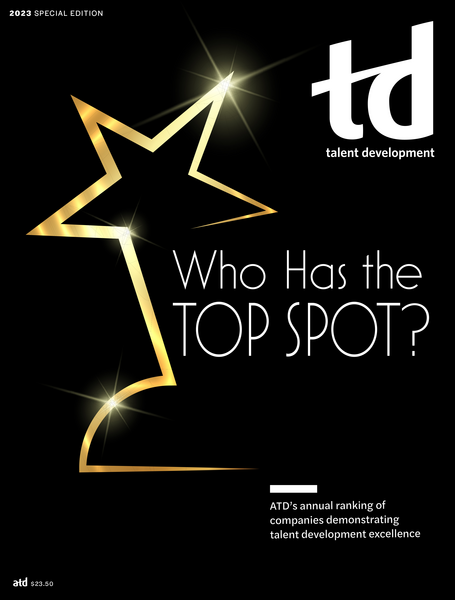TD Magazine Article
Talent Pipelines Create Competitive Workforces
Development for high potentials keeps these companies ready when needed.
Thu Jun 15 2023

The BEST Awards recognize organizations that demonstrate enterprise-wide success as a result of employee talent development. The winners use learning as a strategic business tool to get results. View the entire list of 2023 BEST Award winners.
Development for high potentials keeps these companies ready when needed.
Having a plan in place to fill critical positions within an organization is vital to remain competitive in the IT retail space. Three IT companies have made it a priority to annually review their succession planning processes.
TELUS, a telecommunications company in Vancouver, Canada, aligns its annual review of talent with its people strategy. As a result, it has developed a robust talent pipeline with the skills, capabilities, and diversity of thought required to achieve business success.
Leaders at this Best of the BEST winner (earning a BEST Award 10-plus times) review key roles within the company, examine future business strategies, analyze any talent-related vulnerabilities, and assess the talent pipeline for critical skills before creating action plans to address current skills gaps. Leadership creates structured succession plans and personal development goals. The CEO and executive leadership teams annually review succession plans of vice presidents and above to identify business risks, inform talent acquisition strategies, and ensure that TELUS is recognizing the right talent.
Gap-closing measures at the company include leadership development, cross-team unit movement, talent acquisition, outsourcing talent, and acquisition of other organizations that have required key skills. TELUS identifies successors based on their skills, capabilities, values, experiences, performance track record, and leadership potential. Succession plans typically contain three to five successors for a position. In addition, the company encourages business units to have succession plans for middle management and individual contributors in key positions.
The LNow (Leadership Now) program focuses on developing high-potential leaders, who then receive professional development, mentorship, networking opportunities, coaching, and interaction with senior leaders. Content changes each year to address the biggest business needs, including building a digital mindset, resiliency, storytelling, and change management.
"The program is having impact—85 percent of participants say it has improved their performance, and we see 17 percent of graduates with one or more promotions compared to 6 percent of the overall TELUS population," says Allyson McElwain, director of development and learning.
Ready now
Sony Electronics' next-generation leadership development program, Talking Talent, creates a pipeline of ready-now successors for leadership and critical roles.
Aligned with the company's succession planning and talent management strategy, Talking Talent convenes the talent development team and HR business partners to identify employees with potential (that is to say, learning agility) and proven performance over time. By identifying high-potential employees and ready-now successors, the TD team can create robust development plans, including leadership programs, coaching and mentoring, on-the-job training opportunities, or other relevant support.
The Talking Talent process includes a discussion of the following, examined through a diversity lens to ensure the company provides all talent opportunities to excel:
Critical individual contributors as well as first- and midlevel leaders
Critical roles at the leader level
Business unit leaders below highest-level leader
Business unit heads with top-level leaders
Talking Talent provides an opportunity for HR business partners to review leadership skills, gaps, and needs with business leaders and the president to prepare for the future. As next steps, managers review development activities for each high-potential employee to understand how to address skills gaps. Throughout the year, employees and managers receive toolkits and conversation guides to discuss the employee's growth and development, encouraging an ongoing conversation as needs evolve.
"Talent development is an integral component of our organization's strategic objectives. The talent development team consistently partners with leaders throughout the business to create strategic learning opportunities and align their programs with business goals," says Neal Manowitz, president and chief operating officer of Sony.
Evaluating potential
To cater to the rapidly changing industry of digital entertainment, Tencent Games relies heavily on encouraging learning through knowledge management and practical learning opportunities. To stimulate daily learning for 20,000 employees, the company designed an online learning platform that accompanies staff in each step of their career growth. One way Tencent Games illustrates its dedication to learning and growth is in a company-wide practice development plan calling for volunteers to learn through solving research and development problems together in the form of open-source, co-development groups.
The company conducts a talent review every March to evaluate potential for key management positions. TD professionals outline potential successors as well as create recruitment and development plans, making specific plans for each type of talent, including high potentials, experts, middle managers, and senior managers.
"For high-potential talents, we have developed a … management talent model and provided talent evaluation tools to help businesses identify and select accurately," says Sammi Xia, senior vice president of Tencent Games and honorary dean of its Institute of Games. "For experts with industry achievements and professional accumulation, we have defined the standards of experts and established an incentive mechanism for internal employees and leaders to recommend themselves or for a mentor to nominate them. Up to 80 percent of positions are recommended by internal employees."
Team leaders need to enter the reserve pool and observation period at least six months in advance, take on certain management responsibilities, and participate in special training projects. They earn appointments only after their maturity reaches the required standard.
"The thing to be most focused on is talent," says the CEO of Tencent Games. "The most important thing is the talent \[development\] of employees and teams that form the spine of the organization—this affects how far an enterprise can go in the future and how much value its products can create for users."

